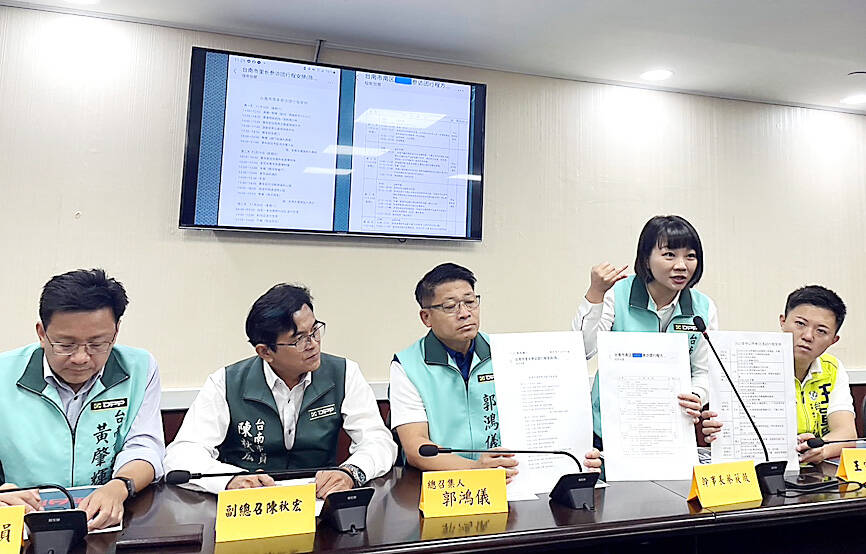Public prosecutors have summoned borough wardens from Tainan who have returned from trips to China amid judicial investigations across the nation into reported incidents of Chinese interference in next month’s presidential and legislative elections.
Kuo Hong-yi (郭鴻儀), Chen Chiu-hong (陳秋宏) and other members of the Democratic Progressive Party (DPP) caucus at the Tainan City Council at a news conference yesterday demanded tougher measures to prevent local officials from helping to organize junket trips to China.
“China is clearly using ‘united front’ tactics to meddle in our elections, by buying off voters and using propaganda, intimidation, pressure and economic enticement to persuade people not to support the DPP,” Kuo said. “It is now a very serious situation ... We know of many borough wardens engaging in it, from almost all of Tainan’s districts.”

Photo: Courtesy of the Democratic Progressive Party caucus at the Tainan City Council
Many wardens have led local residents on tours of China at low prices thanks to huge financial subsidies from the Chinese government, which is “hiding behind the pretext of tourism and cultural exchanges, but its real purpose is to meddle in the January elections,” Kuo said.
Such trips are known as “VIP treatment after landing,” as a person basically only pays for their air ticket to China, and once they land, almost everything is taken care of, with the Chinese government paying for their tour guide, transport, accommodation at luxury hotels, meals, visits to attractions and historic sites, trips to museums and meetings with local officials, Kuo said.
Reports indicate that such interference not only affects Tainan; it affects the whole nation as those heading the groups are elected borough and village wardens, as well as the heads of temples and apartment and neighborhood management committees, Chen said.
On paper, they are collecting fees to pay for the tour, but are actually only paying for the flight, Chen said.
“We have seen people only paying NT$18,000 for an eight-day trip in China; others paid NT$10,000 for a five-day trip,” Chen said.
“This is no different from buying votes... China is infiltrating our local neighborhoods with these subsidized trips,” he said.
Through these trips, Chinese officials are brainwashing Taiwanese, convincing them that China and Taiwan belong to the “same family,” and that they should embrace China, Chen said.
Meanwhile, officials at the Supreme Prosecutors’ Office said they are investigating 115 reports of Taiwanese groups going on Chinese-subsidized tours with more than 500 people involved.
They said that they are also probing 1,820 suspected vote-buying incidents and 822 cases of suspected election betting.

Taiwan is projected to lose a working-age population of about 6.67 million people in two waves of retirement in the coming years, as the nation confronts accelerating demographic decline and a shortage of younger workers to take their place, the Ministry of the Interior said. Taiwan experienced its largest baby boom between 1958 and 1966, when the population grew by 3.78 million, followed by a second surge of 2.89 million between 1976 and 1982, ministry data showed. In 2023, the first of those baby boom generations — those born in the late 1950s and early 1960s — began to enter retirement, triggering

ECONOMIC BOOST: Should the more than 23 million people eligible for the NT$10,000 handouts spend them the same way as in 2023, GDP could rise 0.5 percent, an official said Universal cash handouts of NT$10,000 (US$330) are to be disbursed late next month at the earliest — including to permanent residents and foreign residents married to Taiwanese — pending legislative approval, the Ministry of Finance said yesterday. The Executive Yuan yesterday approved the Special Act for Strengthening Economic, Social and National Security Resilience in Response to International Circumstances (因應國際情勢強化經濟社會及民生國安韌性特別條例). The NT$550 billion special budget includes NT$236 billion for the cash handouts, plus an additional NT$20 billion set aside as reserve funds, expected to be used to support industries. Handouts might begin one month after the bill is promulgated and would be completed within

The National Development Council (NDC) yesterday unveiled details of new regulations that ease restrictions on foreigners working or living in Taiwan, as part of a bid to attract skilled workers from abroad. The regulations, which could go into effect in the first quarter of next year, stem from amendments to the Act for the Recruitment and Employment of Foreign Professionals (外國專業人才延攬及僱用法) passed by lawmakers on Aug. 29. Students categorized as “overseas compatriots” would be allowed to stay and work in Taiwan in the two years after their graduation without obtaining additional permits, doing away with the evaluation process that is currently required,

IMPORTANT BACKER: China seeks to expel US influence from the Indo-Pacific region and supplant Washington as the global leader, MAC Minister Chiu Chui-cheng said China is preparing for war to seize Taiwan, Mainland Affairs Council (MAC) Minister Chiu Chui-cheng (邱垂正) said in Washington on Friday, warning that Taiwan’s fall would trigger a regional “domino effect” endangering US security. In a speech titled “Maintaining the Peaceful and Stable Status Quo Across the Taiwan Strait is in Line with the Shared Interests of Taiwan and the United States,” Chiu said Taiwan’s strategic importance is “closely tied” to US interests. Geopolitically, Taiwan sits in a “core position” in the first island chain — an arc stretching from Japan, through Taiwan and the Philippines, to Borneo, which is shared by